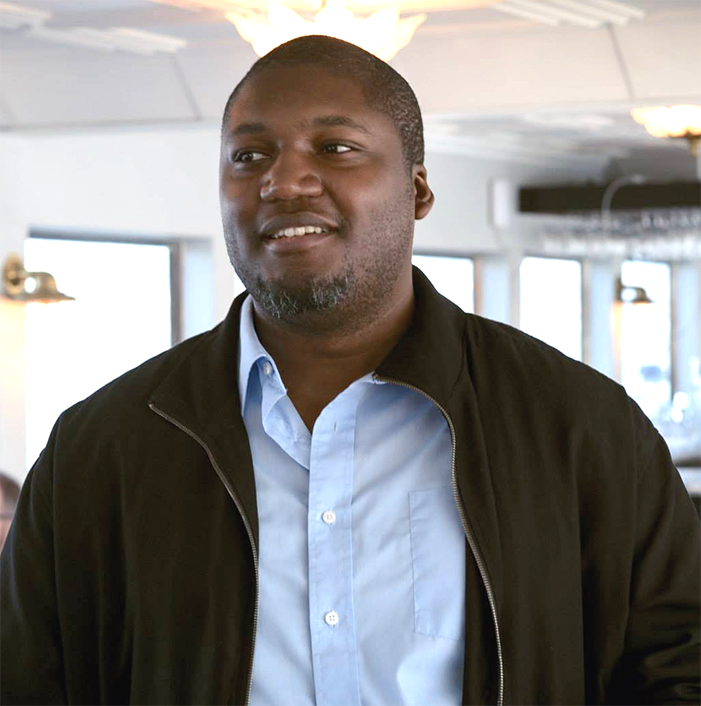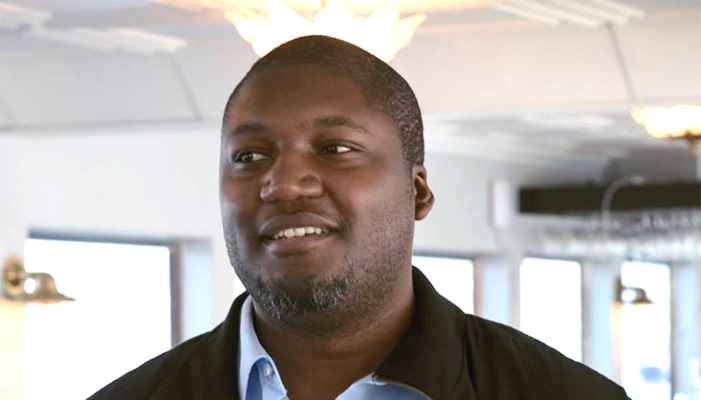Abernathy Man is a series that spotlights remarkable black men and the work they’re doing.

Kwame Thomison is a manager at Facebook who got his first Silicon Valley experience at Meebo, the online messaging company. He credits his time at Meebo as the reason doors at other companies opened. Facebook was one of those open doors. While at Meebo, Thomison had previously been approached by Facebook, but turned down advances to join the tech giant. They saw something in him, though, as they were persistent in bringing him to the company and would finally retain his services in 2012: “You kinda get a feel for where things are headed, like ‘oh, maybe we’ll get acquired, maybe we’ll get an IPO,’ and [at the time] I didn’t really know where things were going so I was like, ‘I should probably look for something new.’ Facebook knocked at the right time.”
The Cornell University grad and current New York resident shared details about some of his primary responsibilities: “My job is to be the glue for all these teams. We’re responsible for making sure all the teams work well together, hit their target goals, and if necessary, create sub-goals as well.” Thomison believes the management at Facebook has done a “good job” mobilizing itself around diversity and that the company is “not asking ‘why,’ but instead saying, ‘how do we solve the problem?’”
“My job is to be the glue for all these teams. We’re responsible for making sure all the teams work well together, hit their target goals, and if necessary, create sub-goals as well.”
Facebook University (FBU) is focused on targeting underrepresented groups like women, Latinos, and blacks, though it is important to recognize they are going far beyond those groups. It is a program designed to generate interest in tech and show participants what it’s like to work on a project that they will later present to the company. “People come in and work on a lower project where the stakes aren’t as high because they have less experience, for iOS or Android, and present it at the end of the summer. This has more of an educational focus than our internship program, as there’s an official curriculum put together.”
FBU’s success rate is on par with Facebook’s general internship program when it comes to converting participants into full-time employees. “[The program] has shown that you don’t have to take people only with experience. You can bring someone up through a program to the full-time level and have the same success as people one would normally think would be successful.”
Thomison spoke about Facebook’s role in bringing more diversity into the tech space—specifically the Lean In program, which was used to bring more women into the company. “It actually made more sense to start with women,” he said. “Facebook had a reputation for being dude-bro centric and women wondered if they’d be comfortable working in that environment. Once you have people at the top who care about this sort of stuff, just for like, one group, it’s not that hard for it to go into other groups.”
“It actually made more sense to start with women. Facebook had a reputation for being dude-bro centric and women wondered if they’d be comfortable working in that environment.”
Thomison also likes Facebook’s “open source” environment when it comes to diversity, stating that it’s more decentralized in some aspects, but supported from those at the very top of the company. One might be under the impression that things can get a bit messy, with so many people working in so many different areas, but Facebook keeps things in order by holding people accountable.
While many companies are jumping on the diversity wave, Thomison also acknowledges some key limitations about the industry. “As big a problem and platform as we have, these companies aren’t built to solve these problems. It’s admirable that companies are sort of springing up internal departments to solve the problem, but they’re not built to solve it. So, I think the real question is, who is?” He also believes some companies think “once you realize it’s out of my control, what do I do next? Some companies are like ‘OK, we’ll just keep going to the Ivy [League] schools and the core schools, and maybe even some HBCUs and it’s like, ‘That’s it. What else am I supposed to do?’”
Thomison has a word of advice for those companies: “When you’re talking about diversity, you can’t keep going to these same core schools. It’s like if you don’t find gold under your mattress, you don’t keep looking under your mattress. You have to look elsewhere.”
